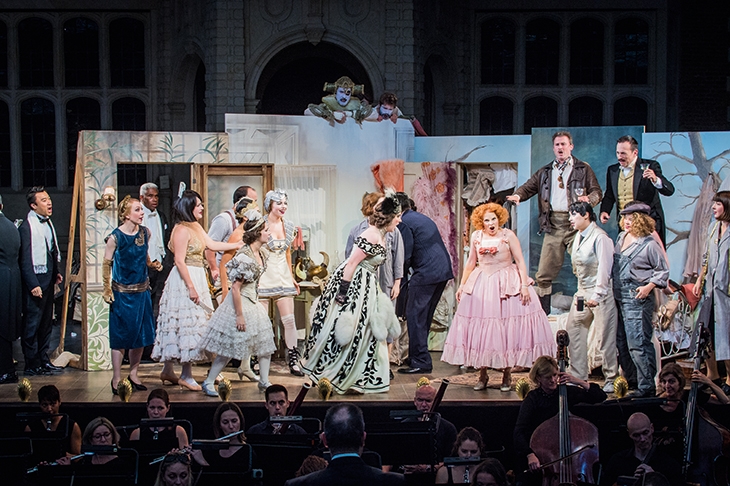The strings sweep upwards, the horns surge, and Leoncavallo’s Zaza throws itself into your arms. We don’t know it yet, but we’ve just heard the drama’s focal point: what David Lynch would call its ‘eye of the duck moment’. The same music recurs near the end of Act One, as the fumbling attempts at seduction of the small-time showgirl Zaza finally come good, and she locks lips with Milio Dufresne, the Parisian dandy who she imagines will take her away from the seedy, bustling demi-monde that we see laid out around her. For now though, in Marie Lambert’s production, the entire cast — playboys, pierrots, divas and stagehands — files out as the prelude plays, and lines up across the entire width of Opera Holland Park’s tented auditorium. All the world’s a stage: well, Zaza’s world, anyway.
This new production of Zaza — first heard in the UK in 1909, and not much since — is the latest in OHP’s ongoing project to rehabilitate verismo, the lush, sometimes sentimental genre that rejuvenated opera at the start of the 20th century, but which has left few survivors beyond Puccini, and Leoncavallo’s own Pagliacci. Zaza is an altogether grander proposition built around a surprisingly modest story, true to verismo’s founding principle that everyday characters can experience mighty emotions. Zaza’s tragedy is her dawning realisation (which takes most of the second half of the opera) that she’s merely a supporting player in the greatest romance of her life.
Alyson Cummins’s designs (sensibly, they’ve left the action pre-1914) help make that point. Act One is a lively backstage panorama, complete with dishevelled dressing room, bicycle-operated stage-machinery, and gossiping, scheming management. Later scenes are played out in increasingly tight focus against a washed-out backdrop: the same screen that we’ve seen in use for the cabaret earlier on, now mocking Zaza’s illusions even while Leoncavallo’s music soars. It’s gorgeous stuff, the music: an Alphonse Mucha poster of a score, all glowing colours and curvy art nouveau climaxes. French settings seem to bring out the best in verismo composers and Peter Robinson, conducting, finds the authentic Massenet-Chabrier belle époque glitter, forever just one beat away from slipping into a waltz.
Anne Sophie Duprels, meanwhile, plays Zaza with a commitment that’s borderline heroic. Duprels is a wonderful artist, and there’s no question that she’s got the vocal chops for a role like this: a dark, lustrous soprano, raw enough to convey realism under pressure, but capable of drawing you close as well as sending silvery bolts of sound streaking over the full orchestra. But here she’s a vulnerable figure, hanging up her glamour with her stage costume and withering visibly as reality does its worst. In the most wrenching moment of the whole evening, sweetness, fear and desperate hope all played across Duprels’s face as she stood there in her socks watching Milio (Joel Montero) leave her to return (as we’ve already guessed, even if she hasn’t) to his wife and child.
From a large ensemble cast, the most engaging characters are Zaza’s ragbag of allies: Louise Winter as her Kümmel-sipping dipsomaniac mother, Ellie Edmonds as her dresser and above all, Richard Burk-hard as her kindly co-star and old flame Cascart, whose warm, eloquent singing gave the whole sorry story its core of integrity. But then, Montero’s Milio is basically a shit in a white tie. His bored response to Zaza’s initial advances was followed by singing whose shallow bluster was an appropriate — if uningratiating — piece of characterisation. Their final duet was largely obliterated when a thunderstorm chose exactly that moment to burst over Notting Hill; but no matter. Once a male character physically strikes a woman, he’s beyond redemption. It’s easy to imagine a more conventionally romantic production of this fascinating rediscovery, but not a more honest one.
All this heartbreak is terribly moreish, and Zaza is in repertory with Olivia Fuchs’s production of Janacek’s Katya Kabanova, first staged in 2009 when Michael Tanner found it ‘an operatic evening in a thousand’. I can confirm that it’s still almost unbearably moving, with (again) a spot-on cast from which it feels unfair to single out Julia Sporsen as a luminous, painfully human Katya and Clare Presland, a bright-eyed life-force as her happier sister-in-law Varvara. Sian Edwards conducted, and it was baleful, headstrong, ecstatic and raw — the thunder from the timpani as Katya takes the fatal step into her lover’s embrace was more dreadful than anything Janacek threw at us in Act Three’s stage storm, or indeed that nature had delivered the previous night. The show looks good too, give or take a bit of hand-wavy business from the chorus, with Yannis Thavoris’s semi-abstract designs sketching in the atmosphere nicely. And like Zaza, it’s located wholly convincingly in the time and place the composer specified. You never know, that might even catch on.






Comments